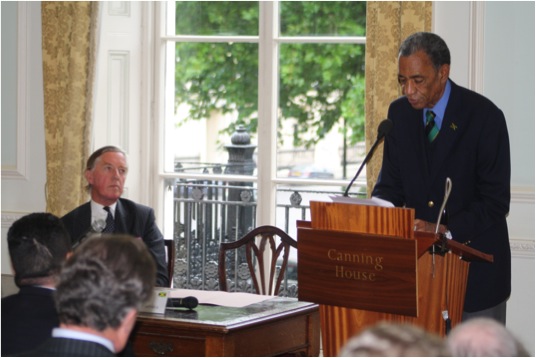Above: Jamaican High Commissioner to the United Kingdom, Anthony Johnson (standing), delivers a lecture on: ‘Historic Relations between Jamaica and the English-speaking Caribbean and Latin America’, at Canning House, in London, on July 19. Director General of Canning House, Dr Charles Goodson-Wickes is at left. (JIS Photo)
Jamaica and the Caribbean at large have shared historic, cultural and trade links with Latin America stretching back for centuries, according to Anthony Johnson, Jamica’s High Comissioner to the United Kingdom.
Over the past three centuries, relations between the English-speaking Caribbean and Latin America have been integral, both in the areas of employment and industrial growth.
“Significant numbers of Jamaican-descended persons now live in communities dominated by Caribbean persons in Costa Rica, Nicaragua, Panama, Colombia and Ecuador,” he said at a lecture at London’s Canning House, the home of the Hispanic and Luso Brazilian Council, an organization founded in 1943 on Anglo-Latin American relations.
Latin America’s recent industrial developments could offer more opportunities for economic collaboration between the two regions, he said.
While there has been relatively limited contact between the two areas, the impact of the islands has been a quiet but significant force in history.
During the construction of the Panama Canal railroad between 1800 and 1850, for example, some 5,000 Jamaicans worked on the project, forming a Jamaican community that still remains active in the city of Bocas del Toro. For a similar project in Costa Rica, some 86,000 Jamaicans migrated to that island to build a railroad from San Jose to Limon.
“Only 63,000 [Jamaicans] are recorded as returning,” he said. “The balance of those who survived established another [community].”
According to Johnson, that community in Limon became a bastion of Protestant Christianity, which spread across Latin America. Marcus Garvey, too, visited this area, and called attention to the plight of workers there.
There is perhaps no greater example of the interaction than Jamaican national hero Alexander Bustamanate, whose original name was Alexander Clarke, and worked in Cuba, Colombia and Panama in the early 20th century.
–Jamaica Information Service
